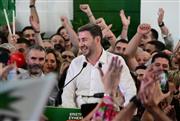Aykan Erdemir: “It is important to remember that Turkey is not Erdogan”
In an interview with Ethnos.gr, former MP Aykan Erdemir denounces Erdogan’s blackmailing tactics as self-defeating, while praising CHP’s stronger emphasis on pluralist and inclusive politics🕛 χρόνος ανάγνωσης: 9 λεπτά ┋

Aykan Erdemir is the senior director of the Turkey Program at the Washington DC-based nonpartisan research institute Foundation for Defense of Democracies (FDD). He was a member of the Turkish parliament representing the Republican People’s Party (CHP) from 2011 to 2015. He talks to Ethnos.gr about Turkey’s presidentially induced economic woes, Erdogan’s self-defeating blackmailing tactics, Imamoglu’s political potential and Greek-Turkish relations.
Turkey’s economy is going through another crisis. Is the “new” presidential system well suited to deal with such challenges? Is there a way out of this and can Erdogan come out of this politically unscathed?
When Erdogan campaigned for transitioning from a parliamentary system to a presidential system in the run up to the April 2017 referendum, he claimed that this move would bring stability and efficiency to the Turkish economy. The economy’s dismal track record since then has proven him wrong. The country’s ongoing financial troubles, exacerbated by the Erdogan government’s mismanagement of the COVID-19 pandemic, continue to pose a great risk not only to the economic wellbeing of Turkish citizens, but also to Erdogan’s ambitions to remain as president for at least two additional terms beyond the end of his current mandate in June 2023.
Turkey’s current economic and public health crisis has once again demonstrated the country’s urgent need for good governance, decentralization, transparency, accountability, anti-corruption measures, and consensus building. Erdogan’s hyper-centralist presidential regime, which led to erratic policy zigzags, has proven to be ill-equipped to offer any meaningful economic reform or build confidence among domestic and global investors. The more Erdogan and his son-in-law, Minister of Treasury and Finance Berat Albayrak, meddle with the workings of the markets on a daily basis, the more they hurt the long-term prospects of the Turkish economy.
Turkey has a resilient business sector with a proven ability to endure crises over the last few decades. If Ankara turns to the IMF, signs a Stand-By Arrangement, and implements structural reform to strengthen good governance and reinstate the independence of the Turkish central bank and regulatory agencies, the Turkish economy can bounce back. But if Erdogan and his son-in-law double down on their crash course, Turkey is likely to exhaust its foreign exchange reserves and experience a balance-of-payments crisis. An economic meltdown in Turkey would not only be disastrous for the country’s 84 million citizens but would also be contagious for other Western economies exposed to Turkish markets. It is hard to imagine Erdogan coming out of such a crisis unscathed.
Of all the actors involved in Turkish politics, are there any that pose a bigger threat to Erdogan’s political future than others?
Erdogan appears to have been most worried about the challenge posed by Istanbul Mayor Ekrem Imamoglu. The Turkish president’s attempts to sabotage Imamoglu’s various initiatives to tackle the COVID-19 outbreak have backfired, further strengthening the Istanbul mayor’s image and popularity at the expense of Erdogan. Imamoglu, who proved himself as a successful catch-all candidate during the 2019 mayoral elections, has also gained further recognition as an all-embracing figure who can be the antidote to Erdogan’s politics of hate and polarization. The Istanbul mayor’s warm outreach to the city’s ethnic, religious, and gender minorities continues to pose a stark contrast to Erdogan’s repeated attempts to scapegoat minorities and peddle hate and prejudice. The real threat Imamoglu poses to Erdogan’s Islamist project is not only his potential to defeat the incumbent president at the 2023 elections but more importantly his ability to reverse Erdogan’s social engineering by popularizing a secular, pluralist, and inclusive ethos.
Where is CHP heading politically? Politicians such as Imamoglu and Kaftancıoglu seem to steer away from the more nationalistic voices.
The CHP’s stronger emphasis on pluralist and inclusive politics is not only driven by a new generation of visionary leaders such as Istanbul Mayor Ekrem Imamoglu and Istanbul Party Chair Canan Kaftancioglu but also by the changing demographics of its 1.2 million members. As Turkey becomes more urban and the service sector more prominent, the country’s growing new middle classes demand policies more in line with the European Union and the Copenhagen criteria. This demographic trend will grow stronger not only transforming the CHP but also the pro-Kurdish Peoples’ Democratic Party (HDP), paving the way for consensus-based politics to replace Erdogan’s politics of hate and polarization.
Of all the risks Ankara has taken (Libya, Syria, S-400), are there any that could backfire in a politically costly way? Are there others that seem to be working out for Ankara?
The risks Erdogan has taken with Syria, Libya and the S-400 air defense system serve his personal agenda well, but at the expense of Turkey’s national interest and Turkish citizens’ wellbeing. The Turkish president’s near-total control of domestic media outlets allows him to exploit his adventurist foreign and security policy to create a rally-round-the-flag effect and boost his image as a strong leader. I would argue that all of these ill-advised steps have already backfired for Turkey, by isolating the country to an unprecedented level and undermining Turkey’s relations with its Western allies. Lately, one of the most popular jokes in Ankara is that the Erdogan government that set out with the motto, “zero problems with neighbors,” has ended up with “zero neighbors without problems.”
Could Turkey revitalize its relationship with Washington without risking big cracks in its relations with Moscow?
Erdogan’s drift from Turkey’s Western allies and pivot toward Russia and other authoritarian regimes is not a tactical move but represents a strategic shift. Despite the ups and downs of Ankara’s relations with Moscow, especially in the Syrian and Libyan theaters of action, Erdogan has proven his commitment to his relations with Putin. It is important to realize that the Erdogan government’s survival requires increasingly authoritarian measures, which would not be welcome within the transatlantic alliance. Hence, the Turkish president feels that he and his outcast regime only have a welcoming home among the authoritarian bloc of countries. I am, therefore, not optimistic about revitalization of Turkey’s relations with either the United States or the European Union as long as Erdogan is at the helm.
From Greece’s perspective, Erdogan’s government chose to “weaponize” the migrant issue by sending thousands of people en masse to the Greek border in Evros in order to blackmail Europe. Do you see tension coming back to Evros sooner or later?
Over the last few years, Erdogan has been very open and on the record about his intentions to weaponize Syrian asylum seekers and made repeated threats to bus displaced Syrians to the European Union borders. The latest inhumane instrumentalization of at-risk asylum seekers during a coronavirus pandemic will remain a disgrace, undermining Turkey’s overall positive track record in hosting 3.6 million displaced Syrians. As Erdogan feels a growing need to divert the Turkish voters’ attention away from the economic crisis and widespread corruption at home, he is likely to weaponize asylum seekers. He also sees this blackmailing tactic as one of the few leverage options he has in negotiations with the European Union. Needless to say, this, too is an ill-advised and self-defeating tactic.
From Greece’s perspective, Erdogan’s government keeps expanding/upscaling its claims towards Athens (Libya is a case in point). Is there still room left for a fair compromise between Greece and Turkey?
Although Erdogan has monopolized power to a great extent and transformed the country into a one-man regime, it is important to remember that Turkey is not Erdogan. Last year’s municipal elections have proven that there is a growing demographics demanding a secular, democratic, pluralist, and inclusive future for Turkey. This will also strengthen demands for a new foreign policy and cordial relations with neighboring countries, reminiscent of the Greek-Turkish rapprochement during the foreign ministry of Ismail Cem between 1997 and 2002. It is true that the belligerent and irredentist tone Erdogan has pushed in foreign and security policy will have lasting effects and outlive his time in office. I would like to hope that the Turkish citizens’ growing realization that win-win relations with neighbors are the precondition to economic prosperity and quality of life will set the tone of post-Erdogan politics at home and abroad. The Aegean that divides us today could once again be a sea that unites us tomorrow.
ΣΥΡΙΖΑ: Η απώλεια της αξιωματικής αντιπολίτευσης, το τάιμινγκ και οι κινήσεις των στρατοπέδων
ΠΑΣΟΚ: Restart στην Αξιωματική Αντιπολίτευση - Το μεγάλο crash test
Γιατί ο ΟΑΣΑ προσανατολίζεται σε περισσότερους ιδιώτες στις συγκοινωνίες - Οι γραμμές... ανά παραγγελία
Στεγαστικό επίδομα για τους σπουδαστές των ΙΕΚ: Οι προθεσμίες για τις αιτήσεις και τα δικαιολογητικά
Live όλες οι εξελίξεις λεπτό προς λεπτό, με την υπογραφή του www.ethnos.gr




